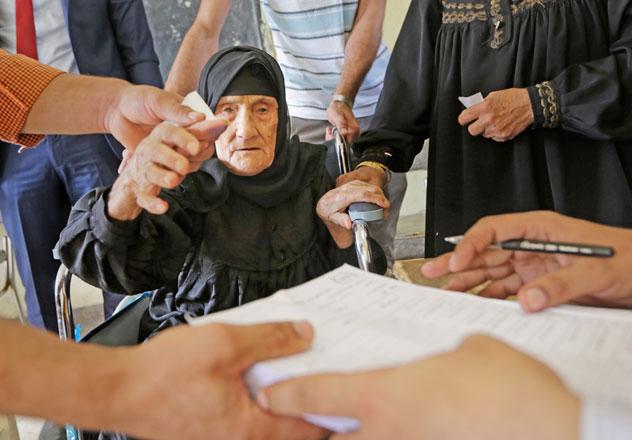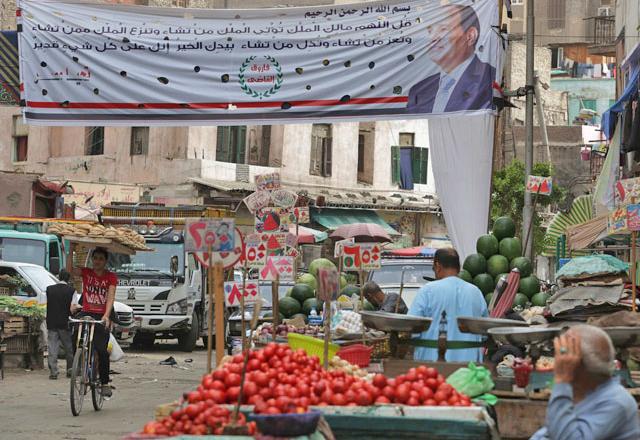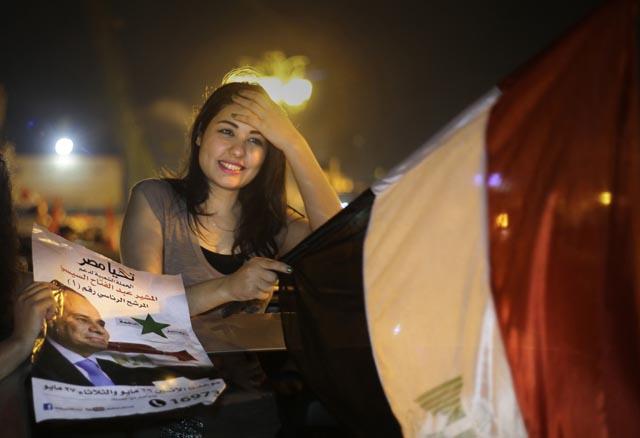You are here
Turnout low in Egypt’s long-awaited parliamentary election
By Reuters - Oct 18,2015 - Last updated at Oct 18,2015

Amnah Sayed Mossa, 80, is given assistance by election officials as she prepares to cast her vote at a polling station during the first round of parliamentary elections in Giza, Cairo, Egypt, Sunday (AP photo)
CAIRO — Egyptians turned out in low numbers on Sunday to vote in the first phase of an election hailed by President Abdel Fattah Al Sisi as a milestone on the road to democracy but shunned by critics who say the new chamber will rubber stamp his decisions.
Many voters were elderly supporters of Sisi, who as army chief toppled Egypt's first freely elected president in 2013 then launched a fierce crackdown on dissent.
Egypt has had no parliament since June 2012 when a court dissolved the democratically elected main chamber, then dominated by the Muslim Brotherhood, reversing a key accomplishment of the 2011 uprising that toppled Hosni Mubarak.
Sisi, the latest man from the military to rule Egypt, ousted elected president Mohamed Morsi of the Brotherhood after mass protests against him.
Many of the young secular activists at the forefront of the 2011 uprising that deposed Mubarak have also found themselves on the wrong side of the law.
Visits by Reuters correspondents to polling stations showed light turnout, in contrast to the long lines that formed at the last election in 2012.
Young Egyptians boycotting the polls were cynical.
“It’s not going to matter. It’s just for show, to show that we are a democracy, and we have elections, and blah blah blah any nonsense,” said Ahmed Mostafa, 25, who works in a lab.
“Most people in our generation feel the same way: that all of this is a show.”
Ahmed Ibrahim, a 34-year-old accountant, had a similar view.
“The youth in Egypt, our ambition in 2011, we were going to build the country — but then suddenly it was stolen from us,” he said.
“Ninety-nine percent of my friends are not going to vote.”
In the working-class Cairo neighbourhood of Gezirat Al Dahab, a judge at a polling station said only about 10 per cent of registered voters had taken part.
Security was tight in a country facing an Islamist militant insurgency.
On paper, the new parliament will have wide ranging powers. It can reject the president’s choice for prime minister or even impeach the president.
But with Muslim Brotherhood leaders and youth activists behind bars, critics doubt it can provide checks and balances.
“The election is a farce. I don’t think anyone in Egypt is taking it seriously,” Muslim Brotherhood official Wafaa Hefny told Reuters.
Soldiers and policemen stood guard outside a polling station in a school in October 6 City on the outskirts of Cairo, where there were only about 30 people casting ballots.
Vans blasted nationalist and pro-army songs. Most voters were elderly or middle-aged, in a country where half the rapidly-growing population is under 25.
“I want the youth to get elected. We need new blood,” said Fatma Farag, an elderly woman.
In Cairo’s low-income Boulaq Al Dakrour neighbourhood, there were far more police and polling station workers than voters.
Few analysts expect turnout to exceed a third of the electorate.
“These elections will result in illegitimate institutions and we will never participate in such elections,” said senior Brotherhood member Mohamed Soudan.
Challenges
Sisi faces many challenges, including widespread poverty, an energy crisis, high unemployment and attacks by militants which have killed hundreds of soldiers and police since Morsi’s fall.
He secured support from other opposition groups for ousting Morsi by promising a prompt parliamentary vote. The elections, repeatedly postponed, will now take place over two rounds on October 18-19 and November 22-23.
This week, voters cast their ballots in 14 regions including Egypt’s second city of Alexandria on the Mediterranean coast.
Critics say an electoral system that puts the emphasis on individuals is a throwback to Mubarak-era politics, which favoured candidates with wealth and connections.
“Being a member of parliament for many is a chance to be close to government. It’s like joining the government club,” said Khaled Dawoud, who recently resigned as spokesman for the Destour Party and Democratic Current electoral alliance.
The unicameral parliament will comprise 568 elected members — 448 elected on an individual basis and 120 through winner-takes-all lists in four districts with quotas for women, Christians and youth. The president may also appoint a further five percent. Final results expected in December.
“For the Love of Egypt,” an alliance of loyalist parties and politicians, is running for all 120 list seats and is expected to do well.
An alliance of socialist opposition parties that had been due to contest eventually pulled out, leaving the field dominated by Sisi loyalists.
The Islamist Nour Party, which came second in the last election, will take part. However, it has lost much support among Islamists since endorsing Morsi’s overthrow.
Speculation is already rife that the constitution will be amended to curb parliament’s powers.
Related Articles
Egyptians cast their votes in a presidential election on Wednesday that is certain to install former army chief Abdel Fattah Al Sisi as president, but his call for an overwhelming mandate did not appear to have been heeded by voters.
The approval of Egypt’s constitution bolsters the powerful army chief but a large number of youths who helped topple two presidents within three years shunned the vote on the new charter.
Ex-army chief Abdel Fattah Al Sisi has scored a crushing presidential election triumph and consolidated the military’s grip, 11 months after the overthrow of the only Egyptian president not drawn from its ranks.


















